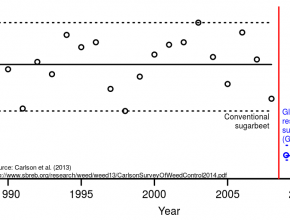How much yield is enough?
Last week, two colleagues and I published a paper in PLOS ONE titled “Commercial crop yields reveal strengths and weaknesses for organic agriculture in the United States.” The article presents an analysis of USDA crop yield data to compare organic and conventional farms in the US. We were pretty careful in the paper not to overstate our conclusions, since our goal was simply to see where organic yields were competitive (or not) with conventional crop yields. I explain more about …
How much yield is enough? Read More
